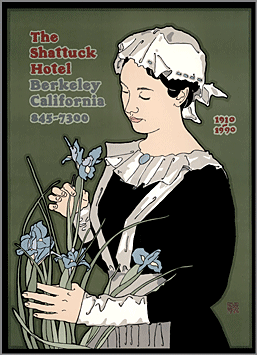
Click on image for detail
(#140) SHATTUCK HOTEL:
Edition of 3136 of which 300 copies are signed 1-300; 26 are signed A-Z as artist's proofs; three sets are signed as progressives; three are signed as dedication copies.
March 31, 1990 14 colors 17-3/8" x 24"
Model: Hannah Love
Styling and Costume: Sophie Maureen Aissen
Client: Eli Cukerman, The Shattuck Hotel, Shattuck and Allston Way, Berkeley CA 94704. Telephone (510) 845-7300 A-Z: Artist's own use Dedication copies: Eli Cukerman, Hannah Love, Sophie Maureen Aissen Progressives: One set to Eli Cukierman(Print's Regional Design Annual, 1991)
I imagine that a visitor from the past would have a hard time reconciling himself to our egalitarian world. It might seem to him that the natural order of things had been destroyed, and all that seemed reasonable had become unreasonable.
He might also feel that he had wandered into an Aladdin's cave, where unseen hands served him, brilliant light appeared at the touch of a finger, and sourceless music entertained him. But, there would be no people to order around or do his bidding, in the old sense of servant and master. Through the lightning-fast progress of the Industrial Revolution, we have replaced human labor with that of machinery, and latterly, electronic devices. The post-industrial world has little use for human servants, and none at all for slaves.
Civilization, war, taxes and slavery instantly resulted from the development of agriculture. Farmers and those who ruled them had servants and-until recently-slaves, to do the bulk of their work, especially the dirty, unpleasant and difficult. In 1790, 97% of the population of North America was engaged in forestry, farming and fishery, leaving 3% to do everything else. Slavery, though a discredited and dying institution, was a definite presence. Two hundred years later, 3% of the population is engaged in providing food for the rest, leaving a surplus labor pool of some 97% which, we are beginning to discover, hasn't got all that much work. Slavery is definitely out of the picture. So far from suffering the labor shortages which created slavery, we've now got an equally serious labor surplus.
But, there are places in society where only people will do: it is difficult to imagine a fancy restaurant dinner without the agency of a waiter or waitress. A really nice hotel has maids and bellboys, who lift daily tasks from your shoulders. They are not replaced by machinery, even though it would perhaps be more efficient and cheaper to do so, because the full experience requires a human touch. We revel in the unaccustomed attentions of another human being: somebody waits for us to order, and brings us our food; they carefully watch to see that we have enough to eat and drink, and hover expectantly, awaiting our wishes. Somebody whisks away the dirty dishes and we never see them again, and when dinner is over, we go to a clean room with fresh sheets, and get up in the morning and don't have to pick up the towels or scrub the tub or make up the bed.
For a small percentage of the population, this was once normal. Today we occasionally visit the "Yesterday Land," of a fine restaurant or hotel, just to experience the pleasure of human attention in small, ordinary matters. Will the rising shortage of work create a social condition similar to that which was formerly created by a chronic shortage of labor? Will the ordinary middle-class person soon be in the same short supply as he was in 1790? Will he become once again the employer of a number of low-paid servants? Will a visitor from 1790 feel right at home in the world of 2090? Stay tuned.